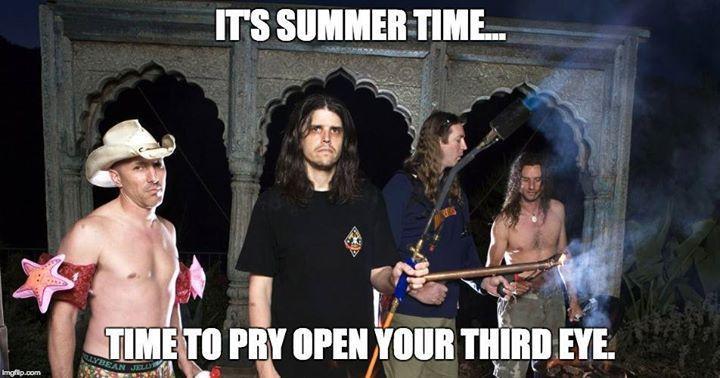Tool is a four-piece musical tour de force based out of Los Angeles. Formed in 1990, the band originally consisted of Green Jelly alumni Maynard James Keenan and Danny Carey, Hollywood set design and makeup specialist Adam Jones, and another aspiring film industry worker named Paul D’Amour. In 1992, the band released the EP Opiate. Although the album has since been certified as platinum, it achieved only modest commercial and critical success during its initial release.
Three years later Tool recorded their first full-length LP, Undertow. Considered a hallmark release in the post-grunge, alternative scene, the album contained the band’s first major hit: “Sober.” Originally composed in 1987 as a track called “Burn About Out” by Keenan’s band Children of the Anachronistic Dynasty, the song underwent a massive lyrical and compositional metamorphosis in the subsequent years. By the time it appeared on Tool’s debut album, “Sober” had morphed into a dark, drop D tuning tale of self-loathing, suffering, and toxic relationships. The entire release is filled with a dark and aggressive energy carried over from Opiate and is highlighted by other standout tracks such as “Intolerance,” “Crawl Away,” and the ever-controversial but immensely provocative “Prison Sex.” The dark artwork, phenomenal musicianship, and poignant lyrical content of the record landed widespread success for the quartet.
In the midst of writing the band’s sophomore release, bassist D’Amour departed the band in 1995. D’Amour later cited a desire to have more creative input in the writing process of music and consequently formed the psychedelic pop band Lusk. Despite D’Amour’s abrupt absence, five of the songs on Tool’s second LP bear his name in the writing credits. D’Amour’s void was soon filled by Justin Chancellor, whose band Peach previously supported Tool during English tour dates. If at all possible, Tool perhaps upgraded their collective musical prowess with Chancellor’s arrival into the fold.
With the release of The Smashing Pumpkins’ 1995 behemoth double-LP Mellon Collie and the Infinite Sadness, the alternative music scene appeared to have peaked for the time-being. Oddly enough, Tool opted to slowly depart from the style of their previous record and began to experiment with psychedelic and progressive elements. After six months spent in Hollywood studios, the end result was 1996’s Ænima. Considered by some to be the high point of Tool’s bright and shining career, the 15-song masterpiece appeared to act as a watershed moment for contemporary progressive music. The combination of elements borrowed from metal, alternative, grunge, electronic, and psychedelia formed a monumental compilation of music which still seems light years ahead of its contemporaries. Filled with classics such as “Stinkfist,” “Pushit,” “Eulogy,” “Forty Six & 2,” and the title track, the record incorporated more ambient sounds and transitional tracks than its predecessor. The lyrical influences of Carl Jung’s philosophy and the continued critical observation of religion and spirituality, make Ænima an ethereal and foreboding album beginning for apocalyptic events to cleanse the vanity and egocentrism of Los Angeles. Dripping with dark comedy evident via a German recipe for deviled eggs, a comical organ-derived intermission track, and a number of clips from comedic legend and dark poet Bill Hicks, Ænima could easily be just about any other band’s magnum opus. But not Tool…
After touring relentlessly for several years, the band began to pursue endeavors outside of their music and dedicate more time to song writing. A tumultuous legal dispute with Volcano Entertainment and outspoken criticism of Napster and other file-sharing services also mired the band in a bit of controversy between records. When Tool entered the studio in October 2000, the expectations from fans and critics were unrelenting. In January of the subsequent year, the band unleashed Lateralus on the world. The album topped the billboard charts and landed Tool a Grammy for the beautiful and flawless “Schism.” Clocking in at just under 79 minutes, Lateralus is one of the longest non-double albums ever conceived. Once again, the band managed to advance their sound and style by implementing aspects of math rock, art rock, and even more progressive time signatures and arrangements. “Lateralus” possesses the mathematical Fibonacci sequence, and the entire album operates as a transcendental experience for anyone who will take the time to listen. The progression of tracks five to nine (“Schism,” “Parabol,” “Parabola,” “Ticks & Leeches,” & “Lateralus”) might be one of the most musically dense and powerful sequence of songs ever put to record. Chancellor asserted himself as a premier bass player. Meanwhile, Carey’s reputation as a literal percussive giant continued to grow. Lateralus was certified as gold within its release week and cemented Tool’s status as the preeminent act in progressive heavy music.
2006 ushered in the arrival of the band’s fourth LP and latest release, 10,000 Days. Occasionally panning by critics and polarizing responses from fans leaves the album’s legacy as a bit less definitive when juxtaposed to the prior three albums. “The Pot” and “Vicarious” both received Grammy nominations and the album contains several fan favorites such as “Jambi” and the bizarrely comical and trippy “Rosetta Stoned.” “Right in Two” is another classic which details mankind’s inherent flaw due to its destructive nature and greedy desires. However, the standout track within such a brilliant collection of songs is clearly the “Wings for Marie” suite (i.e., “Wings for Marie (Pt 1)” and “10,000 Days (Wings Pt 2)”). Perhaps the most emotional writing ever put to paper by Keenan in his long and distinguished career, the two tracks detail the death of his mother, Judith Marie, and his demands for her to receive her eternal salvation. Religion and Keenan’s relationship with his mother are prominent lyrical themes throughout Tool’s albums. Often operating from a critical, if not cynical, standpoint, Keenan appears to make amends with both his mother and her faith after her nearly 30-year-long struggle with paralysis. If any of Tool’s music is worthy of sorrow or inducing tears, it’s these two songs. Still, those critical of the album point to the presence of what they consider to be filler tracks or pointless ambience. Perhaps, the album’s reception was destined to be underwhelming for certain individuals given the quality of both Ænima and Lateralus.
It has been eleven years since the band released 10,000 Days. Rumors of a follow-up release swirl around from time to time. Interviews with band members and friends have resulted in conflicting information regarding the songwriting process and any upcoming studio time. The band continues to tour on a regular basis and has been sighted at many prominent music festivals in recent years. Tool recently headlined the 2016 edition of Voodoo Fest and continues to be a bucket list performance for many fans. The ongoing and excruciating delay in releasing a new album has brought forth a great amount of hostility and bitterness from fans who have cast a captious and occasionally calumniatory view of the band. Many feel betrayed and proclaim that they “deserve” new material from the band which they so love.
But, the band is still one of the most entertaining acts in modern music. Keenan’s banter and witty observations are always entertaining bits of lagniappe at any show. The visual display of lights, music videos, and other accompanying graphics makes Tool performances a treat for multiple senses. Though sets are perhaps never as long as fans would like, the band’s extensive catalog affords them the opportunity to occasionally revisit neglected and overlooked tracks for concerts.
Be sure to listen carefully, and see if you can pry open your third eye.







